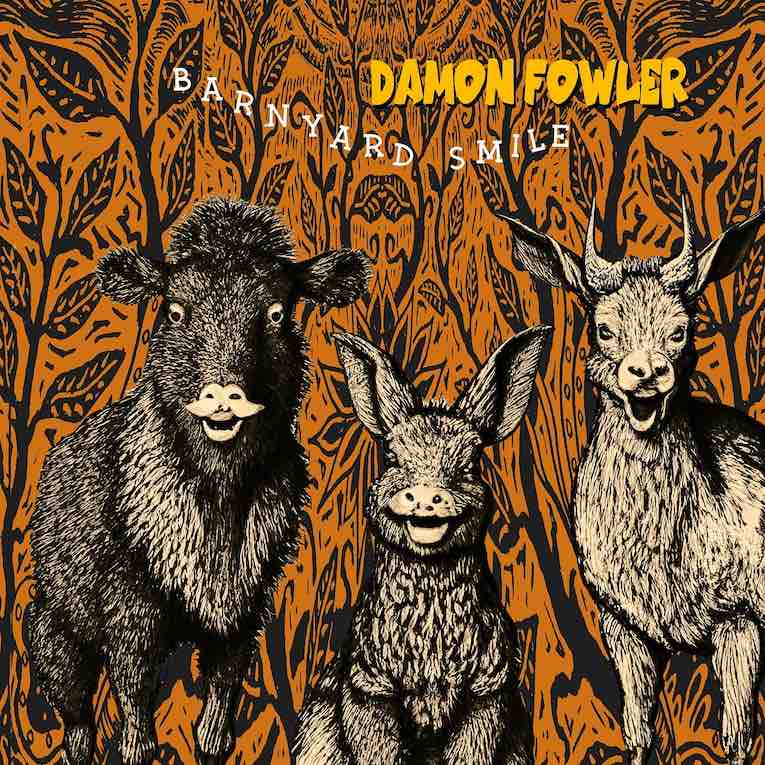
Review: Damon Fowler ‘Barnyard Smile’
By Hal Horowitz
Damon Fowler may not be a household name, but he hasn’t been far from those that are.
Not only has the guitarist/singer/songwriter released 10 albums (two of those live), but he has been a key member of a few Allman Brothers’ Band spinoffs, serving time in Butch Trucks’ Freight Train and The Dickey Betts Band.
Fowler has crossed paths with Rick Derringer and Tab Benoit (both produced his discs), Victor Wainwright, Jimmie Vaughan, Junior Brown, Delbert McClinton, harmonica master Jason Ricci and many other headliners. Although he has had success with his solo work (his previous release, Alafia Moon debuted at #1 on the Billboard Blues Chart and was nominated for a Blues Music Award in the Blues Rock category), he’s still working towards gaining crossover recognition.
The eclectic Barnyard Smile, released June 7, should help achieve that.
While generally considered a blues/rock artist, that is too narrow to adequately describe Fowler’s diverse musical palette. On these ten tunes (eight originals), the Florida native delves into easy flowing soul (“These Games We Play”), swinging country (“Don’t Let Go” could be an obscure Asleep at the Wheel gem), and deep bayou blues (the stripped-down John Lee Hooker stomping “Fast Driving Woman”). The sizzling 60s rock and roll with scorching slide, or is it lap steel, work?) showcase of Bo Diddley’s “Road Runner” sounds like it’s performed by Johnny Winter at his hottest.
Opening “That Ain’t Love” puts him in John Hiatt/Creedence Clearwater territory, with a swampy, singer/songwriter mix. His six-string chops are displayed peeling off lap steel and guitar solos with taut efficiency, taking us on a verbal litany of what is and is not “love” (“One part help, two parts harm”).
He even unplugs for a lovely, skillfully finger-picked folk instrumental “Fruita” which seems plucked from the Ry Cooder songbook. The heartfelt “My Brother,” a bittersweet ballad about losing a close friend, displays Fowler’s emotive vocals. The closing “Misery Loves Company” is a deep track initially from country singer Jerry Reed. Fowler slows it down, radically rearranging it for solo acoustic guitar. He transforms the somewhat trifle of a song in its original form to a moving treatise on the need for human companionship after the end of a long-time relationship (“Her memory keeps haunting me/when I’m by myself”). Subtle and moving.
For all of Fowler’s talents on guitar and as a potent songwriter, the album highlights his expressive voice. Falling somewhere between Oliver Wood, Tab Benoit and John Fogerty, he’s drenched in soul; just scratchy enough to imply he might have downed a few whiskey shots before recording. He sings “When you hold your body against me/It’s like a gas can to a spark” on “These Games We Play,” and you sense the desire in his tone. It’s followed by a tense guitar solo doubling down on that feeling.
Each track connects, aided by outstanding production (by Fowler with George Harris) capturing his playing and singing without affectation. Fowler’s other albums have shown him to be a roots rocker with varied interests. But Barnyard Smile connects those dots with maturity, professionalism and superb songwriting craftsmanship, making it his finest, most uncompromising release yet.
“Grab My Hand”
Damon Fowler website

Looking forward to this release. I really like everything I’ve heard by Damon.